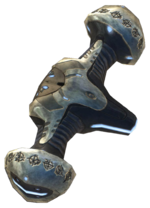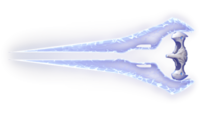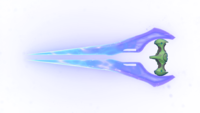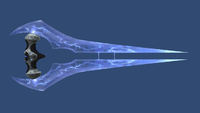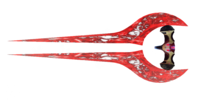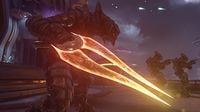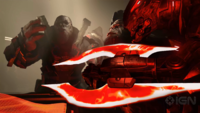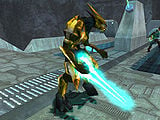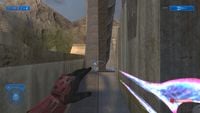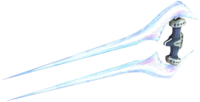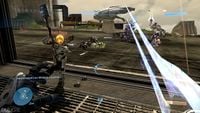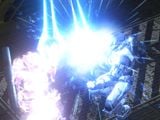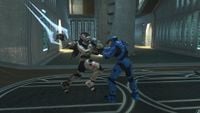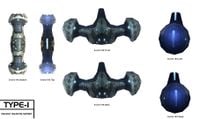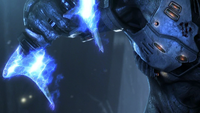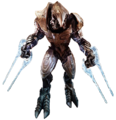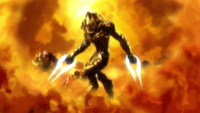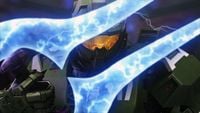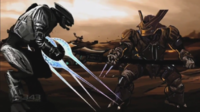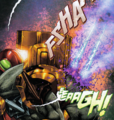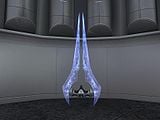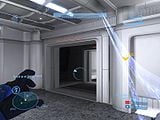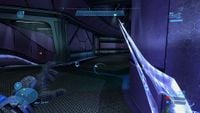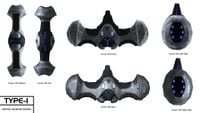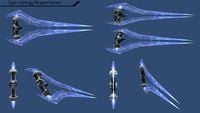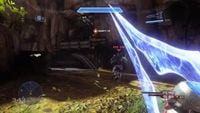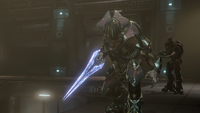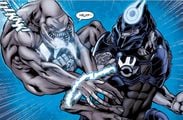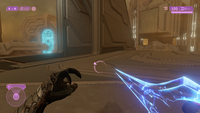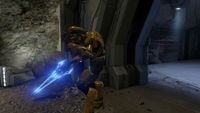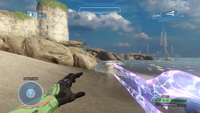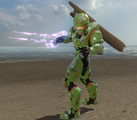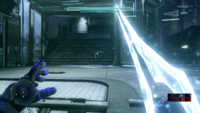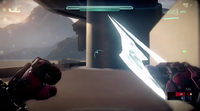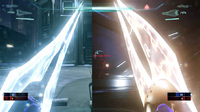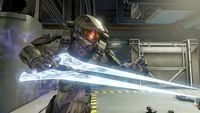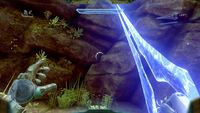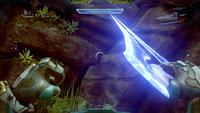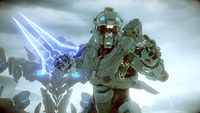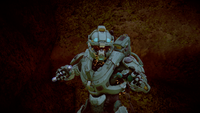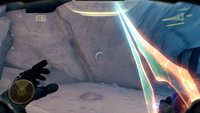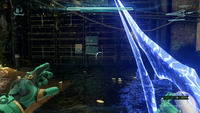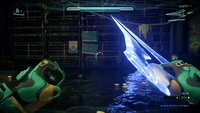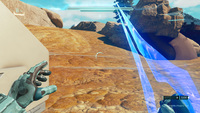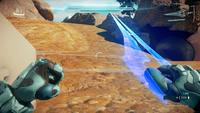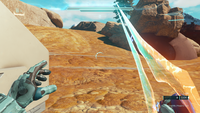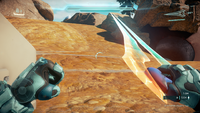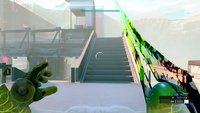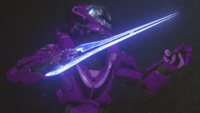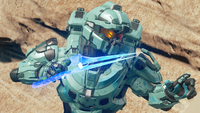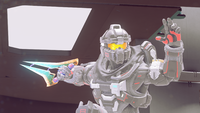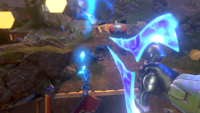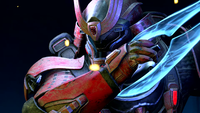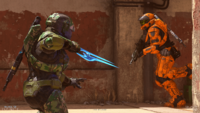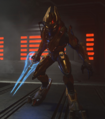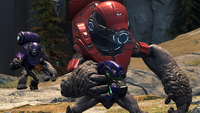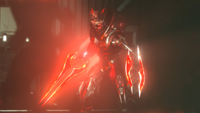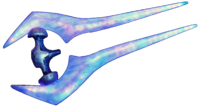User:JackVibe/Sandbox
From Halopedia, the Halo wiki
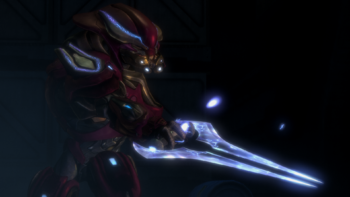
- "A noble and ancient weapon, wielded by the strongest of Sangheili, requires great skill and bravery to use, and inspires fear in those who face its elegant plasma blade."
- — Supreme Commander Thel 'Vadamee[1]
Energy swords, sometimes known as plasma swords,[2][3] are a class of single-handed, double-bladed energy weapons developed by the Covenant and inherited by its splinter factions.[4] To their users, the Sangheili, they are formally designated as fireblades,[5][6] and nicknamed plasma blades.[7] The Office of Naval Intelligence has typically type-classified encountered energy sword variants under the designation of the Type-1 Energy Weapon/Sword (T-1 EW/S).[8] Nicknames for the energy sword includes Katana and Kill Beam.[9]
Overview
Design details
An energy sword's twin blades are superheated plasma contained in a tightly configured magnetic field generated from its grooved hilt.[4][10] Within the hilt, there is an energy storage device that double as a field generation device,[8][11] which, when activated, projects the blade, with the stabilized superheated plasma being enclosed in magnetic lines extending from the hilt.[5][12][13] The weapon is powered by a small battery that supplies power to the plasma generation device and magnetic field generators which generate and contain the plasma needed to form the blade.[14] The battery's energy is reduced for each successful strike. Each strike from the sword will drain the battery by 10% of its maximum energy output. Once the battery power is fully depleted, the sword will deactivate unless recharged. The horizontal hilt forces the wielder to use a punching motion to stab rather than the thrusting motion of most knives and swords.
Some variants, notably the Pelosus-pattern energy sword, contain a fail-safe mechanism that can permanently disable the weapon if the Sangheili wielding it drops it.[15] When dropped, the failsafe engages by deactivating the magnetic field before dispersing the plasma. The plasma then consumes the handle and thus destroys the weapon. The fail-safe is included to prevent enemy infantry from acquiring the weapon and using it.[16]
Mass-produced models generally feature a simple hilt design, but more individualized models can be quite ornate. Different patterns are typically expressed through the shape of the blade; different contours can have either smooth curves or elegant angles. Furthermore, the color of the superheated plasma can vary with no functional difference as well, though most energy swords glow with a blue tint.[17][11] However, Sangheili blademasters are often commissioned to create ornamented and hand-customized for elite individuals.[5] As such, drastic variations have been observed. For example, Arbiter Ripa 'Moramee's matching pair of custom-designed swords had basket-style hilt guards and radiated a high degree of ionized plasma,[18][19] whereas most energy swords contain the blades' plasma with greater efficiency. Arbiter Thel 'Vadam's personal sword, the Prophets' Bane, was pale salmon-colored and had a wider blade compared to mass-produced swords.[20][21] Each energy sword is marked by its creator and first owner, but often their legacy is forgotten.[22]
History
The energy sword's design is seen as the logical evolution of an ancient lineage of traditional Sangheili weapons, most notably the twin-scythe and the curveblade;[5][17] superficially, the ancient melee weapons' influence on the energy sword's design is unmistakable.[23] The sword was originally crafted from hardened resin found in trees which lined the coastal territories of Sanghelios, but as they began carefully exploring Forerunner technology, the weapon was refined over time, eventually taking its current state.[4] Technologically, the energy sword succeeded an older type of Sangheili sword known as the burnblade, which was created by the arm masters of Qikost—one of Sanghelios' moons—in the early period of Sangheili interstellar expansion,[5] and was used in the early years of the Covenant.[24] Modern energy swords are manufactured by the Merchants of Qikost, a prominent group of arms makers on Qikost.[25][13][10] Prior to the the fall of High Charity, they were also manufactured in the city's Assembly Forges.[11][5]
Closely aligned with the Sangheili's rigid sense of honor,[25] the energy sword is the signature weapon of the Sangheili, and its usage has historically been regarded as both an expression of a Sangheili warrior's clerical honor and his personal combat skills.[12][17] The Sangheili pride themselves on their skills with the weapon,[26] which they regard as holy, and believe that it is better for a Sangheili to fall on his sword to redeem his honor than to die dishonorably.[27][28][29][30]
Usage
The Sangheili are very strict on who can be trained in the art of swordsmanship; in civilian life, only aristocrats are permitted to wield energy swords.[25] Sword wielders are not eligible for marriage, though they may breed with any female they choose, married or otherwise, to ensure successful transmission of "swordsman" genes.[4][31]
Within the Covenant military, use of the energy sword is not restricted to aristocrats.[25] Sangheili Minors are generally not permitted to wield the sword because of the high regard in which it is held,[27] though exceptions have been witnessed.[32][33] Storm troops,[34] Ultras, Zealots, Generals, special operations, stealth troops, and honor guardsmen commonly use energy swords.[25][35] Some Sangheili special forces units, notably the Silent Shadow, employed blood red-colored energy swords which (ironically, despite their color) burn hotter than more common models.[17][36][11]
Within the Banished, there is no enforced uniformity for the energy sword, allowing each warrior to customize their weapons to their own needs.[10] That being said, the most common variants appear to be the Domotos-pattern and the Meluth'qelos-pattern.[37][38]
Variants
- Patterns
- Domotos-pattern energy sword - A variant with angular contours and a rectangular hole along the inner edge of either blades, with widespread use among Jul 'Mdama's Covenant and the Swords of Sanghelios.[39][40]
- Ravening Sliver - A blade with a deep blue hue and a green hilt. In War Games, this model can be swung faster than other energy swords.[40]
- Vorpal Talon - A blade that produces an orange-to-cyan gradient. In War Games, this variant allows the user to have two thruster charges before recharging, as well as increased jump height, longer stabilizer duration of 4.95 seconds, increased lunge distance, and a built-in motion tracker that stays visible on the user's HUD even while zoomed in, much like with Linda-058's personal Nornfang SRS99-S5 AM sniper rifle. This weapon can also be found as the second hidden weapon in the final campaign mission Guardians.[40]
- Meluth'qelos-pattern energy sword - A variant with angular contours that saw use among the Banished during the Battle for Zeta Halo.[38]
- Duelist Energy Sword - A purplish-blue colored Meluth'qelos-pattern energy sword with a white hilt. Has increased movement speed. It was used by Okro 'Vagaduun during Battle for Zeta Halo.[38]
- Pelosus-pattern energy sword - A variant with circular contours of the blade around the hilt.[16][35]
- Zokotus-pattern energy sword - A variant with asymmetrical blade design.[41]
- Unidentified energy sword pattern - A variant with a widened gap between the two blades above its hilt.[42]
- Fleet of Retribution variant - A variant used by Sangheili from the Fleet of Retribution in 2552.[43]
- Mdama keep variant - A variant manufactured by 'Mdama keep in 2558 burned less intensely, thus making it harder to cut armor, but causing more grievous injuries and not cauterizing wounds. These swords took advantage of the Sangheili code of honor to make every wound a death blow, as Sangheili who wanted to retain their honor would often commit suicide.[7]
- Colors
- Bloodblade - A red colored energy sword,[44][45] notably used by certain Special Operations units,[17] such as the Silent Shadow.[36][44] Observed to be compatible with the Pelosus-pattern and the unidentified pattern.[46][36]
- Darkstar - A purple energy sword, seemingly associated with old Sangheili mythology.[44]
- Evocati's Edge - A white energy sword is associated with the Evocati.[44]
- Kaidon's Guard - An orange energy sword associated with the Swords of Sanghelios.[44]
- Lance of Suban - A pink energy sword infused with Blamite. The sword and the material originates from Suban.[44]
- Light of Joori - A yellow energy sword, Light of Joori is named after the star Joori.[44]
- Necroplasma - A green colored energy sword.[44] The Domotos-pattern variant features a dull green blade that transitions to an inky black near the basket hilt and was used in Spartan-IV War Games.[21] Another variant was a solid green with a normal hilt.[44]
- Notable personalized variants
- Prophets' Bane - Thel 'Vadam's personal energy sword with a unique handle and pale salmon coloring. In War Games, it gives the wielder an increased lunge distance (the same as the Vorpal Talon), increased movement speed, and active camouflage as long as the weapon is active.[21]
- Ghostpierce - A highly specialized energy sword mounted on Banished operative Jega 'Rdomnai's prosthetic arm repaired at Cherras Keep. Like many, it was two-pronged but had a red coloration and a forked structure.
Combat application
Advantages
The Type-1 energy sword is an extremely devastating and powerful melee weapon when applied during in close-quarters combat. A single strike can even penetrate the energy shield systems, armor, and flesh of a Spartan or a Sangheili. This is due to the design of the weapon, which utilizes ionized gas rather than traditional shaped, solid matter—because the energy sword lacks any solid material in which to hold, or impale anything, the sword does not cut or carve in the traditional sense, but rather boils anything it comes into contact with.[9] The Type-1 Energy Weapon's edge is therefore extremely volatile, being able to slice through even the toughest metals like a hot knife through butter, including ODST battle armor and the Titanium-A class plating of UNSC destroyers.[47][48]
Injuries caused by the weapon are often gruesome. Stab wounds by the energy sword are, in most cases, fatal — as the blade passes through the body, the organs and tissues are cauterized by the extreme temperatures produced by the blades.[49] Body fluids in the area of the stab wound are flash-vaporized upon contact; organs within the area of the stab wounds can suffer life-threatening damage dependent upon which organs are struck. The effects of fluids trapped in organs or arteries and the expansion of heat could lead to ruptures or small explosions, causing additional damage to the victim.
Survival is minimal at best and in the case of non-lethal strikes being administered, proper medical treatment must be applied as soon as possible to ensure permanent survival. Because of the weapon's sheer destructive damage, common forms of fatality to victims include total impalement,[50][51][52] loss of limbs,[53] bodies being bisected[54][55] and decapitation.[56]
Disadvantages
The Type-1 Energy Weapon's most glaring downside is that it is purely a close-quarters weapon; any combat engagement outside of the effective range puts the wielder at risk. It is for this reason that the Sangheili approach sword combat on the battlefield in two different ways, by funneling the enemy into close-quarters to allow them to strike, and/ or to apply a form of stealth using both technology and technique. Without these, the user is vulnerable to attack by all forms of ranged attack, especially from sniper-based counterattacks. Infantry with Overshields are also more resistant when facing this weapon as it can take two strikes before the shield system fails and then another for the killing blow.
Furthermore, the Type-1 Energy Weapon is vulnerable to other magnetic fields, as they can block, disrupt, or possibly even alter the functionality of the sword. Two energy blades clashing together create a small disruption of energy as a result of the same type of magnetic fields clashing together; this clash has a slight area of effect damage that can affect the combatants.
As with most other Covenant weapons, the Type-1 Energy Weapon is battery powered, requiring the user to either recharge the weapon (which can never be performed in-game) or discard it when the power is depleted. Although the handle can generally be used as a club, the Energy Sword's combat effectiveness at that point is minimal. The strength and lethality of the sword in the games are compensated for the sake of gameplay.
Last but not least, the Type-1 Energy Weapon can sometimes expose the position of a Sangheili warrior employing active camouflage due to the weapon's energy output.
Gallery

|
Browse more images in this article's gallery page. |
Screenshots and artwork
A Zealot with an Energy Sword as it appears in Halo: Combat Evolved.
First-person view of the Energy Sword in Halo 2.
The Energy Sword in Halo 3
Two Spartans parrying in the air on Foundry.
An Energy Sword as seen in the Halo Wars announcement trailer.
A study of Arbiter Ripa 'Moramee's custom Energy Swords in Halo Wars.
Arbiter Fal 'Chavamee dual wielding energy swords in Halo Legends: The Duel.
John-117 wielding an energy sword against Thel 'Lodamee in Halo Legends: The Package.
A Sangheili dual wielding energy swords against a Jiralhanae Captain Major in The Return.
Reff 'Talamee kills his brother with an energy sword during the Battle of Line-Installation 1-4 in Halo: Blood Line.
An Energy Sword in the Halo: Reach Beta.
First-person view of the Energy Sword in the final build of Halo: Reach.
A Zealot with an Energy Sword in Halo: Combat Evolved Anniversary.
A Hesduros Zealot killing Junjie Chen with an energy sword during the Battle of Circinius IV in Halo 4: Forward Unto Dawn.
The Energy Sword in Halo 4.
A Commander with an Energy Sword in Spartan Ops.
Jul 'Mdama killing a prisoner with his energy sword in Halo: Escalation.
A Hesduros Zealot with an energy sword during the Terrorist attack on Sedra City in Halo: Nightfall.
First-person view of the Energy Sword in Halo 2: Anniversary campaign.
Rtas 'Vadum with an Energy Sword in Halo 2: Anniversary.
Supreme Commander Thel 'Vadamee with an energy sword in Halo 2: Anniversary's terminals.
Shipmaster N'tho 'Sraom using an energy sword during Operation: FAR STORM in Halo: Hunters in the Dark.
First-person view of the Energy Sword in the Halo 5: Guardians Multiplayer Beta.
The Energy Sword being used with smart scope in the Halo 5: Guardians Multiplayer Beta.
John-117 armed with an energy sword during the Raid on Argent Moon in a Halo 5: Guardians prerelease screenshot.
First-person view of the energy sword by Frederic-104 in the Halo 5: Guardians campaign.
Frederic-104 armed with an energy sword on Genesis.
First-person view of the Vorpal Talon by Edward Buck in the Halo 5: Guardians campaign.
A Freebooter-clad Spartan-IV with an energy sword on Truth.
Rtas 'Vadum using an energy sword in Halo: Shadow of Intent.
First-person view of the energy sword in Halo Online.
Concept art of Leon-011 with an energy sword for Halo Wars 2.
John-117 getting ready to lunge at a Sangheili in the Halo Infinite Campaign Gameplay Trailer.
A Kabuto-clad Spartan wielding an energy sword in the A New Generation trailer.
The Sangheili Warlord Chak 'Lok holding an energy sword.
Covenant Sangheili with energy swords in Halo: The Television Series.
Prop replicas
List of appearances
Sources
- ^ Halo 2, Halo 2 Limited Collector's Edition Manual
- ^ Halo: Combat Evolved: Prima's Official Strategy Guide, page 15
- ^ Halo 2: The Official Strategy Guide, page 30
- ^ a b c d Halo Waypoint, Energy sword (Retrieved on Sep 21, 2011) [local archive] [external archive]
- ^ a b c d e f Halo Encyclopedia (2022 edition), page 307
- ^ Halo Encyclopedia (2022 edition), page 482
- ^ a b Halo 5: Guardians, campaign level Alliance
- ^ a b Bungie.net, Halo: Reach Ordnance Page (Retrieved on Feb 7, 2021) [archive]
- ^ a b Halo Encyclopedia (2011 edition), page 348
- ^ a b c Halo Encyclopedia (2022 edition), page 482
- ^ a b c d Halo: Official Spartan Field Manual, page 183
- ^ a b Halo Waypoint, Halo 4 Interactive Guide - Covenant Weapons (Retrieved on Mar 27, 2014) [local archive] [external archive]
- ^ a b Halo 4: The Essential Visual Guide, page 92
- ^ Halo Encyclopedia (2009 edition), page 335
- ^ Halo: First Strike, page 74
- ^ a b Halo: Combat Evolved, Gameplay
- ^ a b c d e Halo Waypoint, Universe - Weapons - Energy Sword (Retrieved on Oct 23, 2021) [archive]
- ^ Halo: The Essential Visual Guide, page 10
- ^ Halo Wars, Cinematics
- ^ Halo Waypoint, Canon Fodder - Clarity and Grace (Retrieved on Oct 17, 2021) [archive]
- ^ a b c Halo 5: Guardians, Gameplay
- ^ Halo Waypoint, Cannon Fodder: Locke & Load (Retrieved on Apr 13, 2016) [archive]
- ^ Halo Legends - The Duel
- ^ Halo: Broken Circle, page 115
- ^ a b c d e Halo: The Essential Visual Guide, page 63
- ^ Halo Graphic Novel
- ^ a b Halo Encyclopedia (2009 edition), page 127
- ^ Halo Encyclopedia (2011 edition), page 132
- ^ Halo: The Cole Protocol, page 53
- ^ Halo: The Cole Protocol, page 141
- ^ Halo 3, Bestiarum - Sangheili
- ^ Halo Wars, campaign level Alpha Base (Halo Wars level)
- ^ Halo Legends - The Package (animated short)
- ^ Halo 4, campaign level Prologue
- ^ a b Halo 2, Gameplay
- ^ a b c Halo: Evolutions - Headhunters (short story)
- ^ Halo Wars 2, Gameplay
- ^ a b c Halo Infinite, Gameplay
- ^ Halo 4, Gameplay
- ^ a b c Halo 5: Guardians, Gameplay
- ^ Halo Encyclopedia (2022 edition), page 307
- ^ Halo: Reach, Gameplay
- ^ Halo 3, Gameplay
- ^ a b c d e f g h i Halo Waypoint, Canon Fodder - Art of Wort (Retrieved on May 21, 2021) [archive]
- ^ Halo Waypoint, Canon Fodder: Brute Force (Retrieved on Apr 20, 2021) [archive]
- ^ Halo Wars 2, campaign level A New Enemy
- ^ Halo: The Cole Protocol page 84
- ^ Halo: First Strike, page 72
- ^ Halo: Evolutions - Midnight in the Heart of Midlothian, page 91
- ^ Halo 4: Forward Unto Dawn
- ^ Halo Wars
- ^ Halo: The Cole Protocol, page 77
- ^ Halo: The Cole Protocol, page 76
- ^ Halo: First Strike, page 58
- ^ Halo: The Fall of Reach page 99
- ^ Halo: The Cole Protocol, page 79
- ^ Halo: Shadows of Reach, chapter 3
